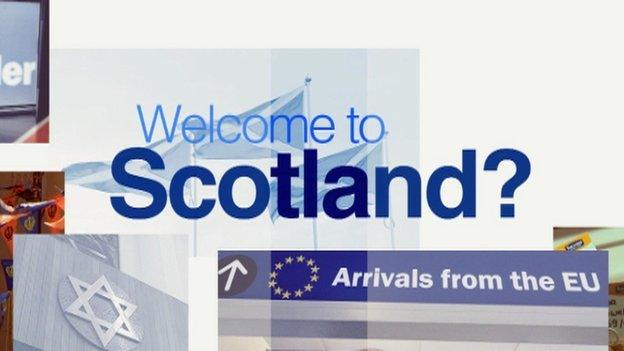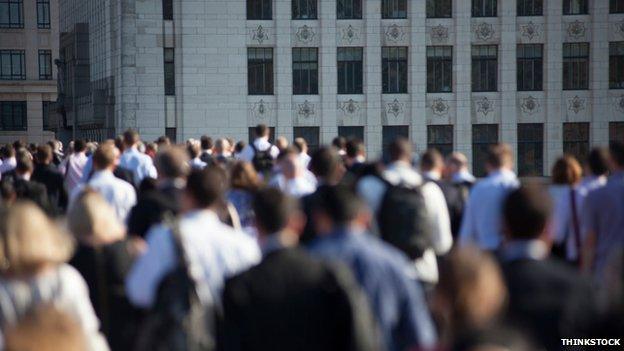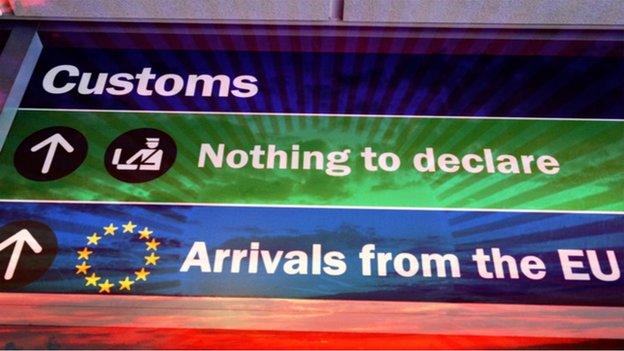Incomers, income and outgoings
- Published

I've been working quite a lot on the subject of immigration into Scotland. And so have BBC colleagues.
We've had more than 180 minutes of radio on the subject and more than 90 minutes of Welcome to Scotland? television, plus at least 10 online articles.
We've also published the results of five opinion poll questions, external, commissioned by BBC Scotland and carried out by YouGov.


You can also read about:
Scotland's immigrant communities
General attitudes to immigration and my previous blog on the poll findings.
Why immigration is seen to matter
The more recent Spanish arrivals in Inverness
Asylum seekers being detained for more than a year
If you like charts to explain things, you might like this.
And what about the various ways of measuring immigration?

Some have been critical of the YouGov/BBC Scotland opinion poll. One tweet that was retweeted several times asked: "Why are the BBC trying to make immigration an issue in Scotland? No one mentioned it at all until you guys did."
The Scottish Refugee Council was unimpressed, and had this to say, external.
Low profile Chinese
To end the week of coverage of this issue, Business Scotland, on BBC Radio Scotland, is hearing from immigrant workers and ethnic minority businesses.
It includes a particularly interesting interview with Sam Chau. We don't often hear from people speaking about the Scots-Chinese community. And it wasn't easy to get people to speak on their behalf. One characteristic, says Mr Chau, seems to be keeping a low profile.
He ran his own printing business for 15 years until selling it, and now manages the Chinese day care centre in Glasgow's Garnethill.
A published author on the Scots-Chinese community, he told me the first Chinese people to settle in Scotland came to study at Glasgow University from the late 19th century.
A much bigger cohort arrived from the 1950s, driven out of Hong Kong by a downturn in farming.
At the last census, 34,000 people said they were ethnically Chinese. At least 7000 of them, at that time in 2011, probably university students. This is now the biggest single overseas student community.
Trading power
Most of the settled Scots-Chinese population are in Glasgow, but it has dispersed more than most ethnic minority communities.
Sam Chau explained to me that this is because of the approach taken to business - not to compete within the community, but to take the Chinese restaurant and takeaway to seemingly every run of shops in the country.
A younger generation are getting educated and entering professions. But this insider's view was of a community that has stuck largely to the catering trade, keeping the business within the family, rather than seeking to grow and expand.
And what of the growth of China as a trading power, I asked? Could that open up new opportunities?
Maybe, was the reply, but China's billionaires now buying up assets around the world are different to Scotland's Chinese people, and he doesn't see much prospect of the two linking up.
Community mentors
For south Asians, it could turn into a very different story, says Ian Collins.
According to the Bank of Scotland's chief liaison with the Asian community, what marks out the Pakistani, Indian and Bangladeshi way of doing business is to be dynamic, moving into new sectors - now including bio-science - with very strong community support for mentoring advice and for credit.

Some have got into imports of food and textiles from South Asia. But with India's economy growing (albeit more slowly than it could), Ian Collins says Scots-Asians have barely begun to tap the opportunity for building up export and distribution networks within South Asia.
By the way, you might like to note that Business Scotland is moving from its 10am slot on Sunday to 7.30am. If that's too early, remember you can subscribe to the podcast here, including this week's programme.
Get-up-and-go
One of the reasons for looking at immigration in Scotland is because we are expecting to see a lot of discussion of it in the Westminster election campaign, and it was important to have an understanding of the Scottish dimension.
There's not much hard evidence of the impact on the economy in Scotland, beyond figures that show 8% of the workforce is ethnic minority or immigrant, and 14% of them are self-employed.
The Hunter Centre for Entrepreneurship at Strathclyde University has had a look at the question of how entrepreneurial migrants into Scotland are.
The conclusion may not surprise much. They 'punch above their weight', it found.
That may be because they have well developed business skills within the community, and setting up in business is normal. It may be that it's in the nature of migration that people have get-up-and-go. Scots emigrants have also demonstrated that.
The Hunter Centre's report puts it this way: "Migrants have higher start-up rates than life-long residents, perhaps because they may be more open to trying new things or because they have higher aspirations, because they are more likely to spot market needs in the local area that are not currently met, or because of difficulties in the labour market". (See page 20 of this, external)
Skills spectrum
What of the UK as a whole? Migration Watch, the campaign group seeking to put more controls on immigration, says it's inevitable that more supply of labour will reduce wages.
It cites one piece of evidence showing a slight reduction in wage rates at the lower end of the skills spectrum.
That was a finding of the UK government's Migration Advisory Committee. It went on to say that the undercutting of wages could be addressed with better policing of the minimum wage law.

"An employer can expect a visit from HM Revenue and Customs once every 250 years and a prosecution once in a million years," it reported, last July, external.
But a different picture emerges from the Centre for Economic Performance. Its pre-election briefing on immigration, external dismisses many of the claims made about the impact of immigrants.
It argues that there isn't much local competition for the kind of jobs that immigrants do. If there were to be an impact from that, you might expect unemployment to rise in areas with most immigration. But that's not what the figures show.
London weighting
The report reflects a sharp rise in numbers. It is reckoned that 7.8m people in the UK were born abroad, and 6.5m people of working age.
The share of immigrants in the UK's working population rose from 8% to 17% between 1995 and 2014. That's a lot, but it's not that far from other, similar countries.
Almost 40% of UK residents born outside the UK live in London. And the London population is 37% overseas-born.
The report also points out that immigrants tend to have either the very low-skilled jobs or the very high-skilled ones.
Where new immigrants compete for low-skilled jobs, it is most often with existing immigrants.
And some of the people doing the low-skilled jobs bring with them a higher level of skills than the British average - a very different pattern to the United States, for instance.
Whereas 23% of the British workforce continued in education past the age of 21, nearly double that proportion of immigrants did so.
Now, it may be that tweet was right, and no-one was asking about immigration before we did.
But because we asked, I hope the Welcome to Scotland? week has spread more light than heat.
- Published11 March 2015
- Published10 March 2015
